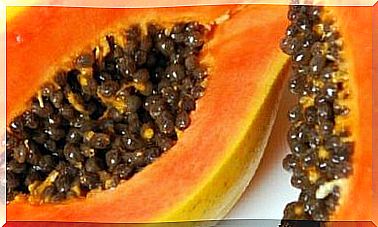Health Effects Of Carotenes

Carotenes are a set of natural compounds produced by plants. These substances are responsible for the pigmentation of fruits and vegetables. In addition, they have many health-promoting properties.
Carotenes are also called chemical compounds that contain carbon and hydrogen atoms. According to several studies, they are nature’s own antioxidants that have disease-preventing effects and are also very important for nature’s function.
The importance of carotenes in nature
In addition to chlorophyll, plants synthesize carotenes to absorb sunlight more efficiently. In other words, they play an important role in the success of photosynthesis. They absorb ultraviolet light, purple and blue light, scatter orange or red light as well as lower concentrations of yellow light.
With the arrival of autumn, chlorophyll (green color) decomposes and other pigments remain visible. Thus, in the fall, you can see a lot of shades of orange, red and yellow, for example, in carrots, pumpkins, tomatoes, sweet potatoes and some flowers. Carotenes are also responsible for the colors of algae and fungi.
In animal species, they produce pigments for bird feathers and beaks, crustacean bones, and fish muscles and scales. In fact, the yellowish adipose tissue typical of omnivorous animal species is the result of carotene storage.
Thus, carotenes are also found in animal products such as milk, butter or eggs.

Classification and operating principles
Carotenes, also known as carotenoids or vitamin A precursors, are fat-soluble compounds. This means that their absorption can be improved by mixing them with lipids.
Carotenes do not lose their nutrients that are beneficial to health during cooking, digestion or frying.
Carotenes are classified into two groups:
- Xanthophylls: lutein and zeaxanthin
- Carotenes: beta-carotene and lycopene
The most common of these are beta-carotene, lycopene and lutein.
Health effects of carotenes
As we mentioned earlier, carotenes have many health-promoting properties related to disease prevention and strengthening the immune system. Below you will find some of the health benefits of carotenes:
They help maintain eye health
Because carotenes are precursors to vitamin A, they are essential for eye health and the prevention of diseases such as blindness, night blindness, and dry eyes. Therefore, it is recommended to eat at least 6 milligrams of carotene daily.
One of the most common eye diseases is retinal degeneration. Continuous exposure to blue light is one of the factors contributing to its onset. However, carotenes are able to absorb blue light and thus prevent damage and even stop the progression of the disease.
Cardiovascular benefits
Because carotenoids are compounds with antioxidant effects, they also suppress inflammatory conditions in the body. In this regard, scientific evidence shows that they reduce the risk of heart disease such as atherosclerosis.
They also help prevent risk factors for heart disease, such as high blood pressure, middle body obesity, and glucose intolerance. All of this reduces the chance of serious cardiovascular disease.
They slow down the aging of the skin
Although skin aging is natural, excessive exposure to ultraviolet radiation speeds up this process. Studies show that including carotenes in your daily diet protects your body from cell changes and prevents skin damage.
Both lycopenes and beta-carotenes are a good choice against skin aging. Various supplements are also helpful.
They prevent diseases
In addition to the benefits mentioned earlier, carotenoids prevent the development of skin cancer. This is related to their antioxidant potential and delayed aging, which eliminates cumulative cell defects. In other words, carotenoids prevent cellular changes that can lead to malignancies.

The main sources of carotene
There is no specific pattern for the distribution of carotenes between different plant groups, but we can find them in vegetables as well as fruits with red, orange, and yellow dyes. These include carrot, mango, red pepper, papaya and tomato.
Carotenes can also be obtained by eating peach, guava, plum, sweet potato, egg yolk, corn, pumpkin, kale and mandarin.
Benefits of carotenes: important to remember
Carotenes have several properties that are beneficial to human health. They are antioxidants that help the body protect cells, tissues and organs from the effects of toxic substances. Thus, they prevent the development of diseases.
For this reason, it is important to include in your diet a lot of foods that are high in carotene. We recommend that you contact a nutritionist or other nutritionist to ask about other immune-boosting plants and fruits.
Carotenes are also present in vitamin A supplements, but you should only use them under medical supervision. Excessive use of vitamin A supplements can cause serious health problems.









